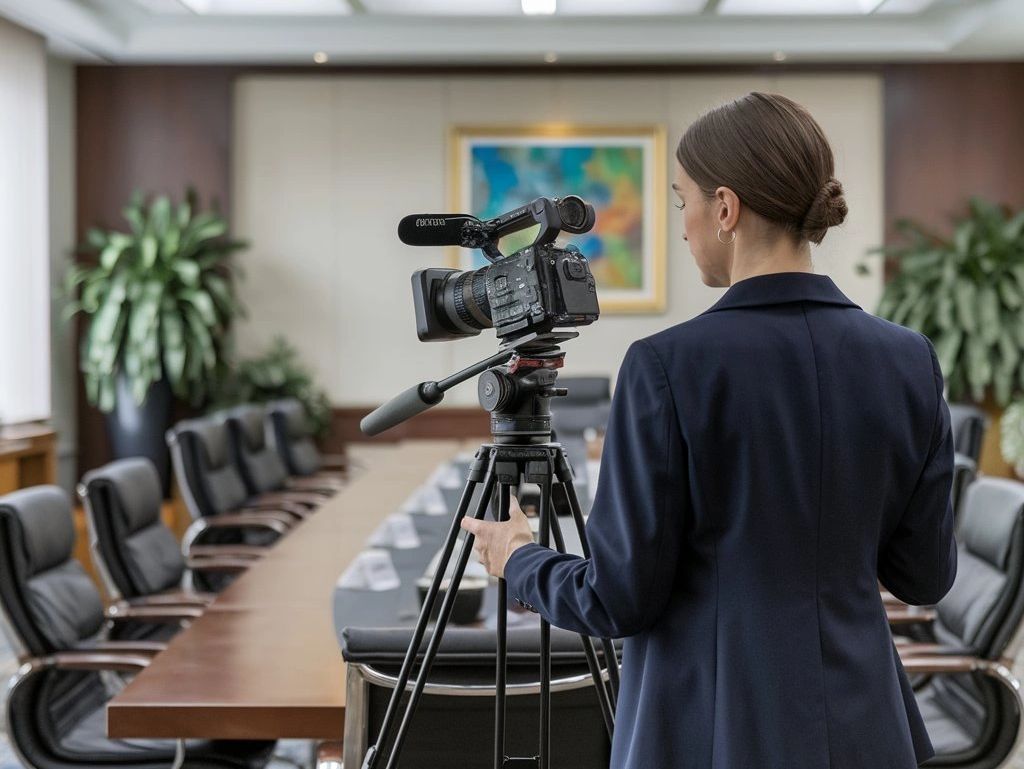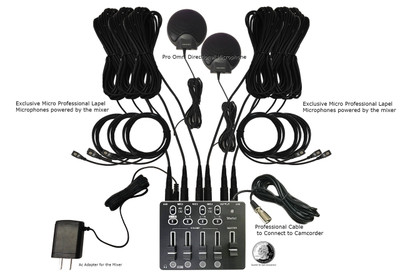The Importance of Lawful Video Clip Depositions in Modern Legal Providers: What You Need to Know
Lawful video depositions have come to be important in today's legal landscape. They provide a multidimensional sight of witness testaments that conventional transcripts just can not match. By recording both non-verbal and verbal communication, these depositions boost the overall understanding of a witness's reliability. However, the performance of video depositions hinges on different variables, including conformity with lawful standards and ideal techniques (legal video depositions). Exploring these components discloses their real importance in modern-day legal services
What Are Legal Video Depositions?
Lawful video depositions function as a vital tool in the litigation process. They entail tape-recording witness testimonies in a video style, catching both verbal and non-verbal communication. This approach permits attorneys to record the disposition, expressions, and responses of witnesses, providing a richer context for the testament. Typically performed in a regulated environment, these depositions are led by lawyers who ask inquiries while a stenotype reporter documents the discussion. The resulting video clip can be vital for trial prep work, as it allows lawyers to examine the credibility of witnesses and refine their approaches. Furthermore, legal video clip depositions can be used in numerous lawful contexts, ranging from civil disputes to criminal cases. The auditory and aesthetic aspects of video depositions enhance the presentation of evidence, making it a crucial element in the contemporary legal landscape. Overall, they add substantially to the effectiveness and efficiency of lawful proceedings.

Advantages of Video Clip Depositions Over Conventional Methods
Video depositions use various benefits contrasted to traditional techniques of taking witness testaments. One considerable advantage is the capability to record both aesthetic and audio aspects, offering an extra comprehensive record of the witness's statements. This twin style enhances quality and enables attorneys to reference certain subtleties during trial preparation. In addition, video clip depositions facilitate remote engagement, making it less complicated for witnesses that may be unavailable for in-person appearances as a result of geographical constraints or wellness issues.Moreover, video clip depositions can quicken the total deposition procedure, decreasing the time and expenses connected with traveling and logistics. They additionally improve access, as videotaped depositions can be conveniently shared amongst legal groups and referenced any time. This convenience adds to far better case management and prep work. On the whole, video depositions stand for a modern, efficient technique to collecting witness statements, aligning with the advancing demands of the legal occupation.
The Duty of Body Language and Tone in Testimonies

In legal video clip depositions, body movement and tone play crucial duties in sharing a witness's credibility and trustworthiness. Nonverbal cues can offer understandings into a witness's mood, influencing just how their testimony is perceived. Recognizing the effect of these elements is vital for lawyers and jurors alike when evaluating the reliability of a testimony.
Nonverbal Interaction Insights
While verbal communication is usually stressed in lawful statements, nonverbal cues such as body movement and tone play a vital role in sharing integrity and emotion. Onlookers of depositions may keep in mind that a witness's stance, gestures, and faces can considerably affect understandings of reliability. Regular eye call might signal confidence, while avoiding look might recommend deceit or pain. The tone of voice-- its rate, volume, and pitch-- can present sensations of sincerity or unpredictability. Legal experts should be in harmony with these nonverbal signals, as they typically provide vital context that enhances spoken words. Comprehending these subtleties can boost the efficiency of depositions and affect the end result of legal process.
Psychological Tone Effect
The psychological tone communicated throughout lawful testimonies greatly impacts exactly how a witness is viewed. Body movement, singing inflections, and faces play crucial duties fit the narrative of a testimony. A witness exhibiting confidence with steady eye call and a calm tone can impart a feeling of reliability and engagement. Alternatively, signs of anxiety, such as fidgeting or a shaky voice, might lead to skepticism regarding their account. The subtleties of psychological expression can influence the interpretation of truths, making it necessary for legal professionals to recognize these signs. In video clip depositions, the aesthetic and acoustic parts combine, highlighting the relevance of psychological tone in communicating sincerity and reliability within the lawful process.
Integrity and Reliability
A crucial variable in establishing integrity and dependability during testimonies depends on the witness's body movement and tone of voice. Observers usually rely upon non-verbal hints-- such as eye get in touch with, stance, and motions-- to analyze a witness's sincerity. For instance, a witness that maintains eye get in touch with and displays open body language might be regarded as even more sincere and trusted than one who prevents eye get in touch with or appears shut off. Furthermore, intonation plays a necessary function; a stable, tranquil tone can enhance the credibility of the testimony, while fluctuations in pitch or quantity might raise questions. Eventually, the combination of body movement and vocal tone greatly affects just how a witness's declarations are obtained and interpreted in a lawful context.
Finest Practices for Performing Video Depositions
Conducting video clip depositions requires cautious preparation and implementation to assure a efficient and clear presentation of statement. First, it is necessary to choose a silent, well-lit location to minimize distractions and secure optimal video clip top quality. The tools needs to be tested in breakthrough, including cams, microphones, and illumination, to avoid technological problems throughout the deposition.Next, parties involved must assess the style and procedures beforehand, making certain that every person comprehends their duties. The deponent should be informed on the process, consisting of exactly how to respond plainly and concisely.Additionally, keeping a specialist attitude throughout the session is necessary. This consists of abstaining from talking over one an additional and confirming that all questions are directed appropriately. Ultimately, it is important to tape-record the deposition in a layout that enables easy playback and review, maintaining the honesty of the testament for future use.
Lawful Factors To Consider and Conformity Issues
How do legal factors to consider and compliance concerns impact the performance of video depositions? Lawyers should browse a complex landscape of laws, making certain that video clip depositions abide by jurisdictional rules and criteria. Conformity with regulations worrying privacy, permission, and taping methods is crucial. For example, acquiring explicit permission from all events entailed is required to avoid lawful repercussions.Additionally, the admissibility of video proof in court can rest on conformity with procedural requirements. Making certain that the tools made use of meets technical criteria is also important, as poor quality can undermine the deposition's reliability.Moreover, attorneys need to understand any kind of details state laws that govern video depositions, as these can vary substantially. Failing to resolve these factors to consider can not only jeopardize the integrity of the deposition however also affect the general case method, eventually affecting the client's lawful end results.
Exactly How Video Depositions Impact Court Perception
While video depositions can offer as effective tools in legal process, their influence on court understanding is substantial. The visual and acoustic aspects of video recordings provide jurors with a much more thorough understanding of witness temperament, reputation, and psychological reactions. This multimedia strategy can improve the jurors' capability to examine the reliability of testimony contrasted to typical text-based transcripts.Moreover, video clip see here now depositions permit jurors to observe body movement, intonation, and faces, every one of which can impact their interpretation of the witness's statements. The existence of a witness on screen can humanize them, promoting empathy and connection, which may persuade jurors' opinions. Conversely, a witness that appears unreliable or incredibly elusive on video may bring about negative perceptions that affect a jury's choice. Ultimately, the dynamic nature of video clip depositions plays a crucial role in shaping just how jurors analyze evidence and reach their decisions.
The Future of Video Clip Depositions in Legal Technique
As advancements in technology continue to reshape the lawful landscape, the future of video depositions is positioned for significant evolution. Advancements such as expert system, online fact, and enhanced video clip conferencing devices are anticipated to streamline the deposition process and boost ease of access. Lawyers might use AI-driven analytics to assess witness credibility and situation stamina much more effectively.Moreover, the combination of virtual truth could enable juries to experience immersive simulations of depositions, offering deeper context and understanding. In addition, the trend towards remote depositions is likely to persist, using higher versatility for attorneys and clients alike.As remote job becomes progressively stabilized, video depositions will likely become typical technique, decreasing prices and time restraints connected with typical techniques. On the whole, these technological developments guarantee to boost the effectiveness, efficiency, and accessibility of video depositions in legal method, ultimately transforming check my blog how legal professionals prepare for trial.
Regularly Asked Questions
Just How Much Do Lawful Video Depositions Typically Cost?

Can Video Depositions Be Utilized in Any Kind Of Kind Of Situation?
Video clip depositions can be utilized in different kinds of cases, including civil, criminal, and family members law. Their adaptability enables attorneys to existing witness testimonies properly, adapting to the specific requirements of various lawful situations.
What Tools Is Needed for a Video Clip Deposition?
To conduct a video clip deposition, important tools includes a high-grade electronic camera, microphone, illumination, and a reliable recording device. Furthermore, a computer system with editing and enhancing software application might be necessary for post-production and formatting the last video clip.
How much time Does a Typical Video Deposition Last?
A regular video deposition lasts between two to four hours, depending on the complexity of the case and the number of questions posed. Prolonged sessions might happen, however breaks are normally integrated for participant comfort.

Are Video Clip Depositions Admissible in Court?
Video clip depositions are usually permissible in court, given they abide by lawful criteria and policies of proof. Their use improves clarity and preserves witness testimony, helping in the judicial procedure throughout tests and hearings. Lawful a fantastic read video depositions have become important in today's lawful landscape. In addition, lawful video depositions can be utilized in different lawful contexts, varying from civil disagreements to criminal instances. Additionally, video depositions promote remote involvement, making it less complicated for witnesses who may be unavailable for in-person appearances due to geographical restrictions or health and wellness issues.Moreover, video clip depositions can quicken the total deposition procedure, reducing the time and costs connected with traveling and logistics. Making sure that the devices used fulfills technical criteria is likewise important, as inadequate top quality can threaten the deposition's reliability.Moreover, lawyers have to be mindful of any kind of particular state laws that control video depositions, as these can differ significantly. In addition, the pattern towards remote depositions is most likely to linger, providing better flexibility for customers and attorneys alike.As remote job comes to be significantly stabilized, video clip depositions will likely become common practice, minimizing prices and time restrictions linked with conventional techniques.
Comments on “A litigation checklist: What to bring to your legal video depositions session”